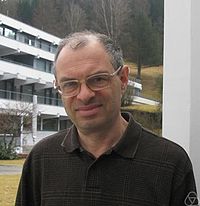Victor Ginzburg Scientist
Victor Ginzburg (born 1957) is a Russian American mathematician who works in representation theory and in noncommutative geometry. He is known for his contributions to geometric representation theory, especially, for his works on representations of quantum groups and Hecke algebras, and on the geometric Langlands program (Satake equivalence of categories).The book "Representation theory and complex geometry", by Chriss and Ginzburg,is nowadays a classical text on geometric representation theory. In an influential paper by Beilinson, Ginzburg,and Soergel, the authors introduced the concept of Koszul duality (cf. Koszul algebra) and the technique of"mixed categories" to representation theory. Ginzburg and Kapranov developed Koszul duality theory for operads. In noncommutative geometry, Ginzburg defined, followingearlier ideas of Kontsevich, the notion of Calabi-Yau algebra. An important role in the theoryof motivic Donaldson-Thomas invariants is played by the so-called "Ginzburg dg algebra",a Calabi-Yau (dg)-algebra of dimension 3 associated with any cyclic potential on thepath algebra of a quiver.Ginzburg received his Ph.D. at Moscow State University in 1985, under the direction of Alexandre Kirillov and Israel Gelfand. He is currently a Professor of Mathematics at the University of Chicago.
Search
Scientist
| doctoral advisor | |
|---|---|
| doctoral student | Nicolas Guay Travis Schedler Vladimir Baranovsky Wee Liang Gan |
| Field of study |
